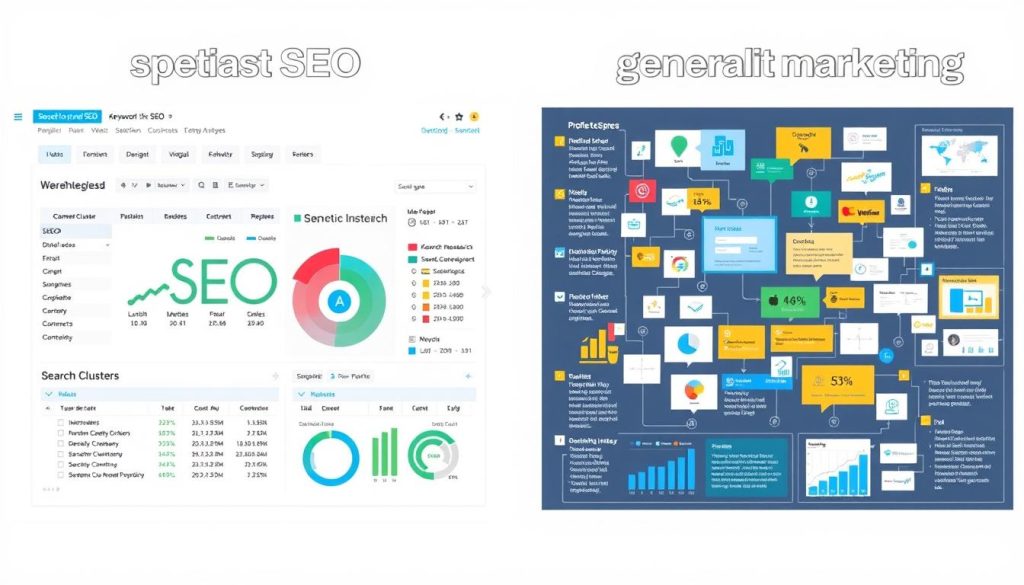In today’s competitive digital landscape, businesses face a critical decision: invest in specialist SEO expertise or opt for generalist digital marketing services. While both approaches have their place, understanding the distinct advantages of specialized SEO can significantly impact your online visibility, traffic quality, and ultimately, your bottom line. This comprehensive guide explores why specialist SEO vs generalist digital marketing isn’t just a matter of preference—it’s often a strategic necessity for businesses with specific growth objectives.
Understanding the Core Differences: Specialist SEO vs Generalist Digital Marketing
The fundamental difference: depth vs breadth in digital marketing approaches
Before diving into the benefits, it’s essential to understand what truly separates these two approaches. A generalist digital marketing strategy casts a wide net across multiple channels—social media, email, content, paid advertising, and basic SEO. The focus is on breadth rather than depth, with resources distributed across various marketing tactics.
In contrast, specialist SEO concentrates exclusively on optimizing your online presence for search engines. This focused approach encompasses technical SEO, content optimization, link building, and user experience improvements—all designed specifically to improve organic search visibility and traffic quality.
Generalist Approach
- Covers multiple marketing channels
- Provides broad marketing coverage
- Often less expensive initially
- Good for businesses testing different channels
Specialist SEO Approach
- Deep expertise in search optimization
- Focused strategy with measurable results
- Continuous adaptation to algorithm changes
- Higher ROI potential for search traffic
7 Key Benefits of Investing in Specialist SEO Services
1. Technical Expertise That Drives Performance
Specialist SEO providers bring deep technical knowledge that generalists simply cannot match. From advanced schema markup implementation to core web vitals optimization and complex site architecture improvements, specialists understand the technical foundations that search engines reward. This expertise translates directly to better crawlability, indexation, and ultimately, higher rankings for competitive keywords.

2. Targeted Keyword Strategy and Search Intent Mastery
While generalists might perform basic keyword research, SEO specialists develop comprehensive keyword strategies based on search intent, competitive analysis, and conversion potential. They understand the nuances between informational, navigational, and transactional queries, allowing them to align content perfectly with user needs at each stage of the buyer journey.

3. Adaptive Algorithm Tracking and Strategy Refinement
Search algorithms change constantly—Google alone makes thousands of updates yearly. SEO specialists dedicate themselves to tracking these changes, understanding their implications, and rapidly adapting strategies to maintain or improve rankings. This proactive approach prevents traffic losses that often impact businesses working with generalists who lack the bandwidth to stay current with algorithm shifts.
4. Comprehensive Technical Auditing and Implementation
Specialist SEO services include regular, in-depth technical audits that identify issues invisible to the untrained eye. From duplicate content and canonical issues to crawl budget optimization and JavaScript rendering problems, specialists not only identify technical barriers but implement solutions that generalist marketers might miss entirely.
5. Superior ROI Measurement and Attribution
SEO specialists implement sophisticated tracking and attribution models specifically designed for organic search. This precision allows businesses to accurately measure return on investment from SEO initiatives—something generalists often struggle with when juggling multiple channels. With specialist SEO, you’ll understand exactly which strategies drive results and deserve additional investment.
6. Content Optimization Beyond Surface-Level Tactics
While generalists might create “SEO content,” specialists develop comprehensive content strategies based on topic clusters, semantic relevance, and search intent mapping. They optimize existing content assets for maximum search visibility and create new content specifically designed to capture targeted search traffic with high conversion potential.

7. Seamless Integration with Development and Business Goals
Specialist SEO providers excel at bridging the gap between technical SEO requirements and business objectives. They work effectively with development teams to implement changes, prioritize improvements based on business impact, and align SEO strategy with broader marketing goals—creating a cohesive approach that generalists often struggle to achieve.
Comparing ROI: Short-Term vs Long-Term Investment Perspectives
When evaluating specialist SEO vs generalist digital marketing, understanding the ROI timeline is crucial. Generalist approaches often deliver quicker but smaller initial results across multiple channels. In contrast, specialist SEO typically requires more upfront investment with exponentially greater returns over time.
| Timeframe | Specialist SEO | Generalist Digital Marketing |
| 1-3 Months | Technical foundations established, initial content optimizations, baseline improvements | Quick wins across multiple channels, immediate but limited traffic increases |
| 4-6 Months | Ranking improvements for target keywords, traffic quality increases, conversion optimization | Performance plateaus without additional investment, diminishing returns |
| 7-12 Months | Significant ranking improvements, substantial traffic increases, strong conversion rates | Requires constant reinvestment to maintain results, inconsistent performance |
| 12+ Months | Compounding returns, reduced dependency on paid channels, sustainable growth | Increasing costs to maintain results, limited compound growth |
Real-world example: An e-commerce retailer switched from generalist digital marketing to specialist SEO services, investing the same monthly budget. After 12 months, their organic traffic increased by 143%, while cost per acquisition decreased by 64%—demonstrating the long-term ROI advantage of specialist expertise.
Making the Right Decision for Your Business Goals

Choosing between specialist SEO and generalist digital marketing ultimately depends on your specific business goals, resources, and competitive landscape. Here are actionable insights to guide your decision:
When Specialist SEO Makes Sense:
- Your industry has high-value search traffic with purchase intent
- You operate in a competitive market where ranking advantages matter
- Your business has a longer sales cycle requiring nurturing
- You already have established brand awareness
- You seek sustainable traffic that doesn’t require ongoing ad spend
When Generalist Approach Works Better:
- You’re just establishing your online presence
- You need immediate visibility across multiple channels
- Your target audience isn’t primarily using search engines
- You have limited budget and need to test various channels
- Your business model relies on short-term conversions
Budget Allocation Considerations
When allocating marketing budget, consider the quality of traffic rather than just quantity. Specialist SEO typically delivers higher-intent visitors with greater conversion potential. For many businesses, the ideal approach is to begin with a 70/30 split between specialist SEO and complementary marketing channels, adjusting based on performance data.
Industry-Specific Considerations
Different industries benefit from specialist SEO in unique ways. E-commerce businesses typically see the highest ROI from product page and category optimization. Professional services benefit most from expertise-demonstrating content. Local businesses gain advantage through specialized local SEO tactics. Understanding your industry’s specific search patterns is crucial when evaluating specialist SEO vs generalist digital marketing approaches.
Checklist: Identifying High-Quality Specialist SEO Providers
If you’ve determined that specialist SEO aligns with your business goals, use this checklist to identify quality providers who can deliver results:
- Demonstrates deep technical SEO knowledge beyond basics
- Provides case studies with measurable results in your industry
- Offers comprehensive audit process before making recommendations
- Shows clear understanding of search intent and user experience
- Maintains transparency about methods and avoids “secret techniques”
- Presents realistic timeframes and expectations for results
- Demonstrates knowledge of recent algorithm updates and trends
Essential Qualifications
Remember that true specialist SEO providers focus on sustainable results rather than quick fixes. They should be able to clearly explain their methodology and how it aligns with your specific business goals. Most importantly, they should demonstrate how their specialized approach will deliver superior ROI compared to generalist digital marketing strategies.
Conclusion: Aligning Your Strategy with Business Objectives
The debate between specialist SEO vs generalist digital marketing ultimately comes down to your specific business goals, competitive landscape, and resources. For businesses that rely heavily on search traffic or operate in competitive industries, specialist SEO offers distinct advantages that generalist approaches simply cannot match.
By investing in specialized expertise, you gain access to deeper technical knowledge, more sophisticated strategy, and ultimately, better results from your search marketing efforts. While generalist digital marketing has its place, particularly for businesses just establishing their online presence, specialist SEO delivers the focused expertise needed to truly excel in organic search.
Ready to Explore Whether Specialist SEO Is Right for Your Business?
Take the first step toward understanding how specialist SEO can transform your online visibility and drive qualified traffic to your website. Our team of SEO specialists will analyze your current performance and provide actionable insights tailored to your business goals.

